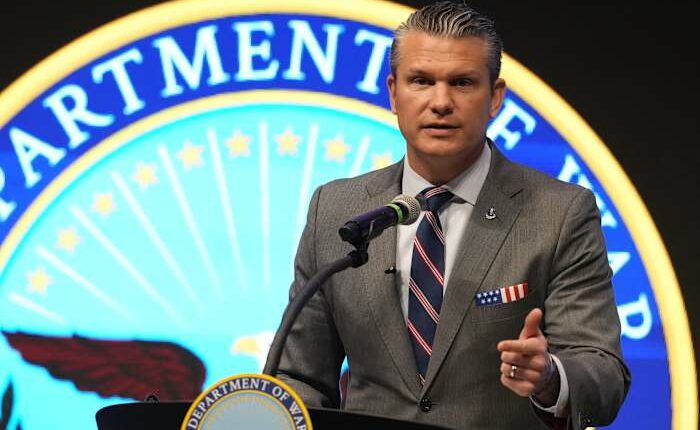Share this @internewscast.com

In a significant escalation of its campaign against drug trafficking in South American waters, the U.S. military has conducted its 20th strike on a vessel suspected of transporting narcotics, resulting in the deaths of four individuals. This incident, confirmed by a Pentagon official on Friday, underscores the Trump administration’s intensified efforts in the Caribbean Sea.
The most recent strike occurred on Monday, as revealed by an official who requested anonymity due to the sensitive nature of the information. This latest action brings the cumulative death toll from strikes, initiated in September, to 80. Previously, the Mexican Navy had ceased its search for a survivor from a late October strike after four days of efforts.
The attack coincided with two additional strikes announced by Defense Secretary Pete Hegseth on Sunday. This comes amid the deployment of the USS Gerald R. Ford aircraft carrier to the region, following its journey from the Mediterranean Sea. As the nation’s most advanced warship, its arrival is anticipated to bolster the U.S. military’s already significant presence in these waters.
On Thursday, Defense Secretary Hegseth formally introduced the mission as Operation Southern Spear, highlighting the increased focus and enduring nature of U.S. military operations in the area. With the Ford’s arrival, the mission will expand to include nearly a dozen Navy ships and approximately 12,000 sailors and Marines.
Despite the Trump administration’s claims that this naval buildup aims to curb drug flows into the United States, it has yet to provide evidence supporting the classification of those killed as “narcoterrorists.” The strikes have predominantly targeted vessels in the Caribbean Sea, with additional operations in the eastern Pacific Ocean, a known corridor for cocaine smuggling from major production regions.
Some analysts suggest that the deployment of the aircraft carrier serves as a strategic show of force against Venezuelan President Nicolás Maduro, who is facing narcoterrorism charges in the U.S. However, there remains debate among experts on whether U.S. warplanes might target land-based sites to increase pressure on Maduro to resign.
Secretary of State Marco Rubio says the U.S. doesn’t recognize Maduro, who was widely accused of stealing last year’s election, as the leader of Venezuela and has called the government a “transshipment organization” that openly cooperates with those trafficking drugs toward the U.S.
Maduro has said the U.S. government is “fabricating” a war against him. Venezuela’s government this week touted a “massive” mobilization of troops and civilians to defend against possible U.S. attacks.
Trump has justified the attacks by saying the United States is in “armed conflict” with drug cartels and claiming the boats are operated by foreign terror organizations that are flooding America’s cities with drugs.
Lawmakers, including Republicans, have pressed for more information on who is being targeted and the legal justification for the strikes.
Rubio and Hegseth met with a bipartisan group of lawmakers who oversee national security issues last week, providing one of the first high-level glimpses into the legal rationale and strategy behind the strikes.
Senate Republicans voted a day later to reject legislation that would have put a check on Trump’s ability to launch an attack against Venezuela without congressional authorization.
Copyright 2025 The Associated Press. All rights reserved. This material may not be published, broadcast, rewritten or redistributed without permission.











